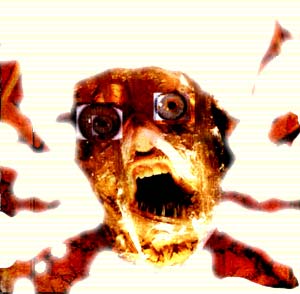‘The difference between insanity and genius is measured only by success…’
Elliot Carver
Indeed. And it is this success that Will Self craves in furthering shifts and bends into the skulls of his characters in Quantity theory of Insanity; his first collection of short-stories. It’d be better if I review each story so as for clearer reference.
The North London book of the dead begins with the end of a narrator’s mother. She has died and has been buried while he is struggling to come to terms with the loss. He tries to console himself with the notion that she must have gone to a better place or somewhere in that direction. Eight months later, he meets her on the street. She tells him that she lives in North London which is an after-life residence for the dead. Creepy but worth reading.
The second short-story, Ward 9, is longer and more unsettling. Here the narrator, Misha Gurney, comes to work at a hospital’s mental ward as an art-therapist only to find the insanity of the patients and their world infecting him as well. There is soon a completed trinity of sex, drugs and psychiatry which has shocking results.
Understanding the Ur-Bororo is a satirical saga of a complex and driven anthropologist, Janner who tries to make it big by studying one of the most elusive Amazon tribes to have ever existed. The Ur-Bororo tribe whose name translates as ‘The people who you wouldn’t want to be cornered by at a Party’ and indeed you wouldn’t because the only characteristic that this tribe possesses is that they are the most boring people on the planet.
This brings us to the title story, The Quantity theory of Insanity. Here we meet the narrator and the struggle he went through to come to his most ground-breaking theory that the psychiatry academy has ever been subject to. This theory is so self-evident and fundamental that it is laughable. The theory argues that there is only so much sanity going round and that if measures are taken to eradicate insanity in a particular group of people then it is liable to crop up somewhere else. Hilarious to us but the horrid, theoretical world of psychiatry is not so overlooking. The author went to great lengths in trials and research to complete the theory but now it seems that the academia loves the theory too much to let it go. Self satirizes the research and academic industry for failing to come with concrete proofs and always coming up with theories that hold little ground. The demographically learned set is the only set, group, institution or quantity that is really insane.
Mono-cellular is the only story in this collection that I absolutely loathed. I know Self was trying to make a point about the sheer loneliness and delayed train of thought of the character in question but I found it too bloody boring compared to the other stories. In fact, it is one of the worst stories I have ever read.
WARNING: this section of the book was read under the heavy influence of cider.
I was waiting to get out of this thesaurus world of Will Self with its languid yet compelling language. I couldn’t wait. Then there was Waiting, reading which, I have learnt to be a little more patient for the sake of my sanity.


No comments:
Post a Comment